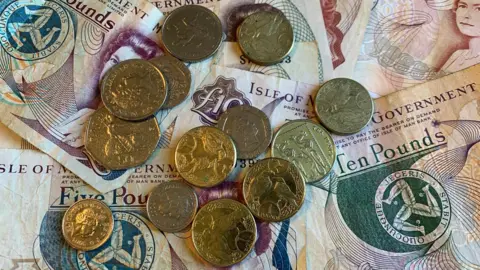Call to overhaul minimum and living wage processes
 BBC
BBCSeveral proposed changes to how the Isle of Man's minimum and living wages are calculated will be voted on by members of Tynwald next month.
A review into the current methodology has been published by the Department for Enterprise (DFE).
The latest minimum wage adjustment was agreed by Tynwald in February, which puts the current hourly rate at £12.25.
The non-compulsory living wage stands at £13.74 per hour, a rise of 69p from the previous year.
Eight recommendations have been made in the DFE review.
It suggested that the island's minimum wage should in future be set as a percentage of the Isle of Man's median earnings.
The recommendation is that it should be set at 66% of median earnings.
The DFE review has called for the proposed rate to be submitted to Tynwald for approval by October.
If agreed, it would be implemented from April.
'Economic realities'
The Manx government has previously outlined its aim for the minimum wage to align with the living wage.
But that was put on hold pending the DFE review and its recommendations being debated in Tynwald.
Treasury Minister Alex Allinson said: "When Tynwald stated the ambition of delivering parity between the minimum wage and living wage by 2026, no-one was aware of the significant challenges businesses would face, including increased inflationary pressures."
The recommendation to focus on setting the rate against median earnings was "in line with neighbouring jurisdictions", Allinson explained.
He said setting an annual target of Tynwald approving minimum and living wages by October each year would ensure "businesses have enough notice to prepare" for their introduction from the following April.
'Strike the right balance'
The Isle of Man's Chamber of Commerce backed the report's proposals, calling for Tynwald to support all the recommendations.
While it welcomed the principle of linking the minimum wage to median earnings, the chamber wanted more clarity on how this would be calculated, and what sources of data would be used.
CEO Rebecca George said the chamber backed moving to calculations based on 66% of median earnings "because this method reflects international norms".
It was also "a more sustainable and balanced alternative to aligning the minimum wage directly with the living wage", she added.
Enterprise Minister Tim Johnston said his government "must try to strike the right balance between the need to support low-paid earners whilst also considering economic realities".
He said: "The report highlighted a clear need to look at minimum wage methodology to avoid uncertainty and give workers and businesses clarity on pay and timelines."
Read more stories from the Isle of Man on the BBC, watch BBC North West Tonight on BBC iPlayer and follow BBC Isle of Man on Facebook and X.
